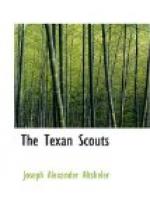All the while Ned was running for the timber. A certain reason was appearing in his actions, and he was beginning to think clearly. He curved about as he ran, knowing that it would disturb the aim of the Mexicans, who were not good shots, and instinctively he held on to the lance, whirling it about his head, and from time to time uttering fierce shouts like an Indian warrior wild with battle. More than one Mexican horseman sheered away from the formidable figure with the formidable weapon.
Ned saw other figures, unarmed, running for the wood. A few reached it, but most were cut down before they had gone half way. Behind him the firing and shouting of the Mexicans did not seem to decrease, but no more groans or cries reached him from the bank of smoke that hung over the place where the murdered recruits lay. But the crash of the fire, directed on the other columns to right and left, still came to him.
Ned saw the wood not far away now. Twenty or thirty shots had been fired at him, but all missed except two, which merely grazed him. He was not hurt and the superhuman strength, born of events so extraordinary, still bore him up. The trees looked very green. They seemed to hold out sheltering arms, and there was dense underbrush through which the cavalry could not dash.
He came yet nearer, and then a horseman, rifle raised to his shoulder, dashed in between. Sparks danced before Ned’s eyes. Throat and mouth, lips and his whole face burned with smoke and fever, but all the heat seemed to drive him into fiercer action. He struck at horse and horseman so savagely that the two went down together, and the lance broke in his hands. Then with a cry of triumph that his parched throat could scarcely utter, he leaped into the timber.
Having reached the shelter of the trees, Ned ran on for a long time, and finally came into the belt of forest along the San Antonio River. Twenty-six others escaped in the same way on that day, which witnessed the most dreadful deed ever done on the soil of North America, but nearly four hundred were murdered in obedience to the letter sent by Antonio Lopez de Santa Anna. Fannin and Ward, themselves, were shot through the head, and their bodies were thrown into the common heap of the slain.
Ned did not see any of the other fugitives among the trees. He may have passed them, but his brain was still on fire, and he beheld nothing but that terrible scene behind him, the falling recruits, the fire and the smoke and the charging horsemen. He could scarcely believe that it was real. The supreme power would not permit such things. Already the Alamo had lighted a fire in his soul, and Goliad now turned it into a roaring flame. He hated Urrea, who had rejoiced in it, and he hated Santa Anna who, he dimly felt, had been responsible for this massacre. Every element in his being was turned for the time into passion and hatred. As he wandered on, he murmured unintelligible but angry words through his burning lips.




